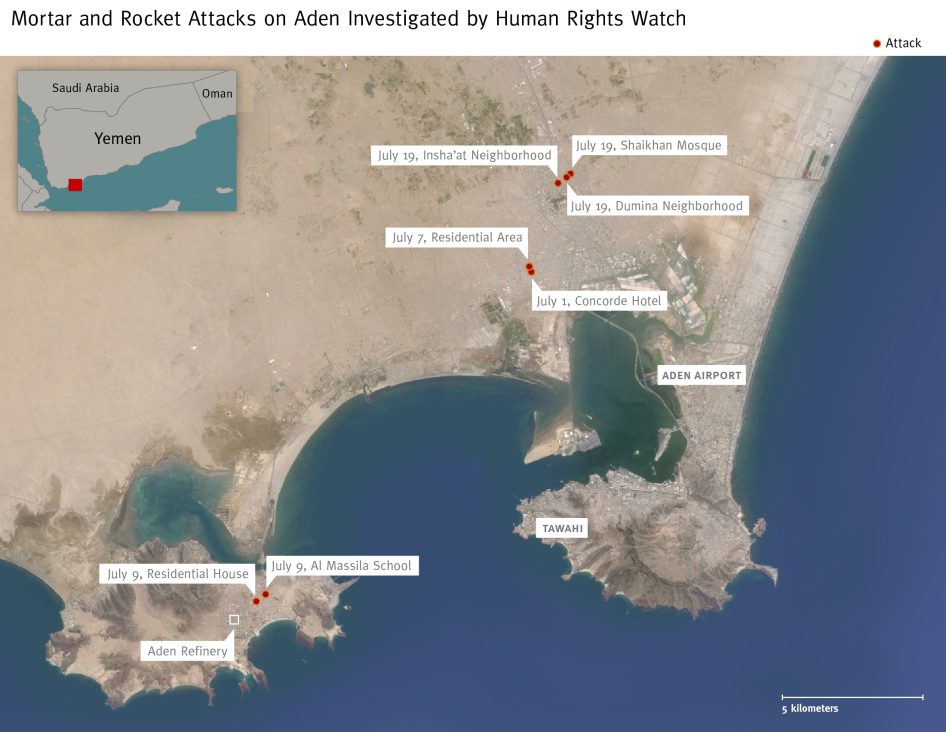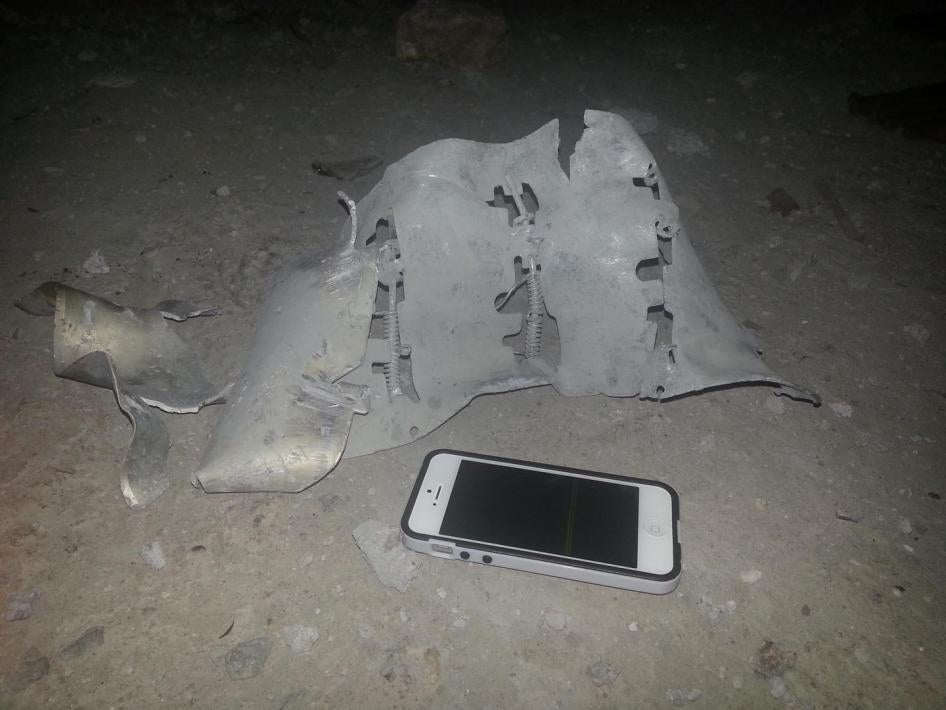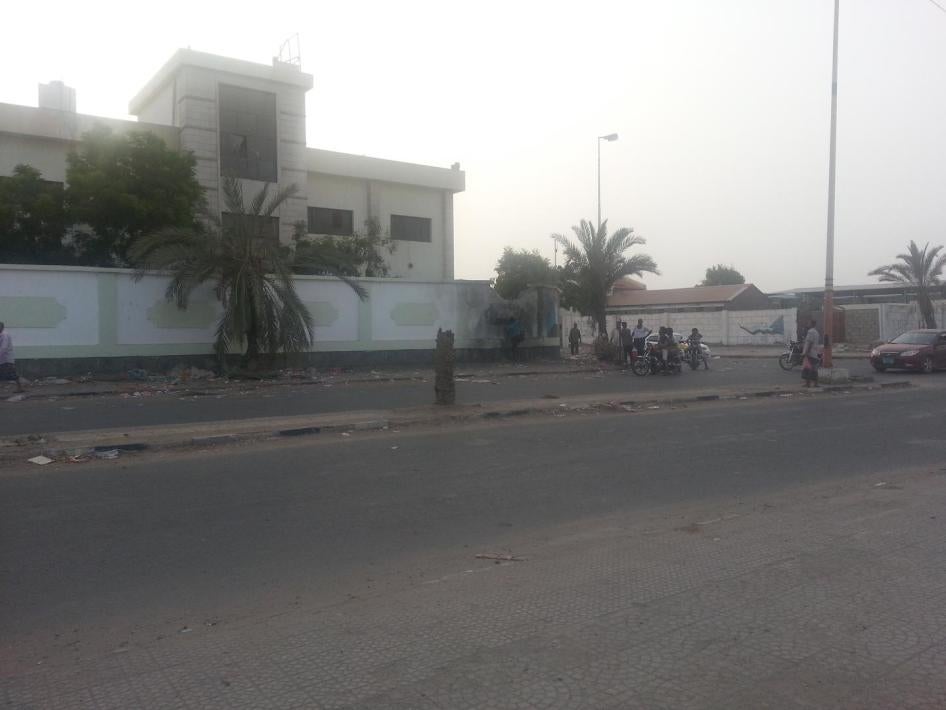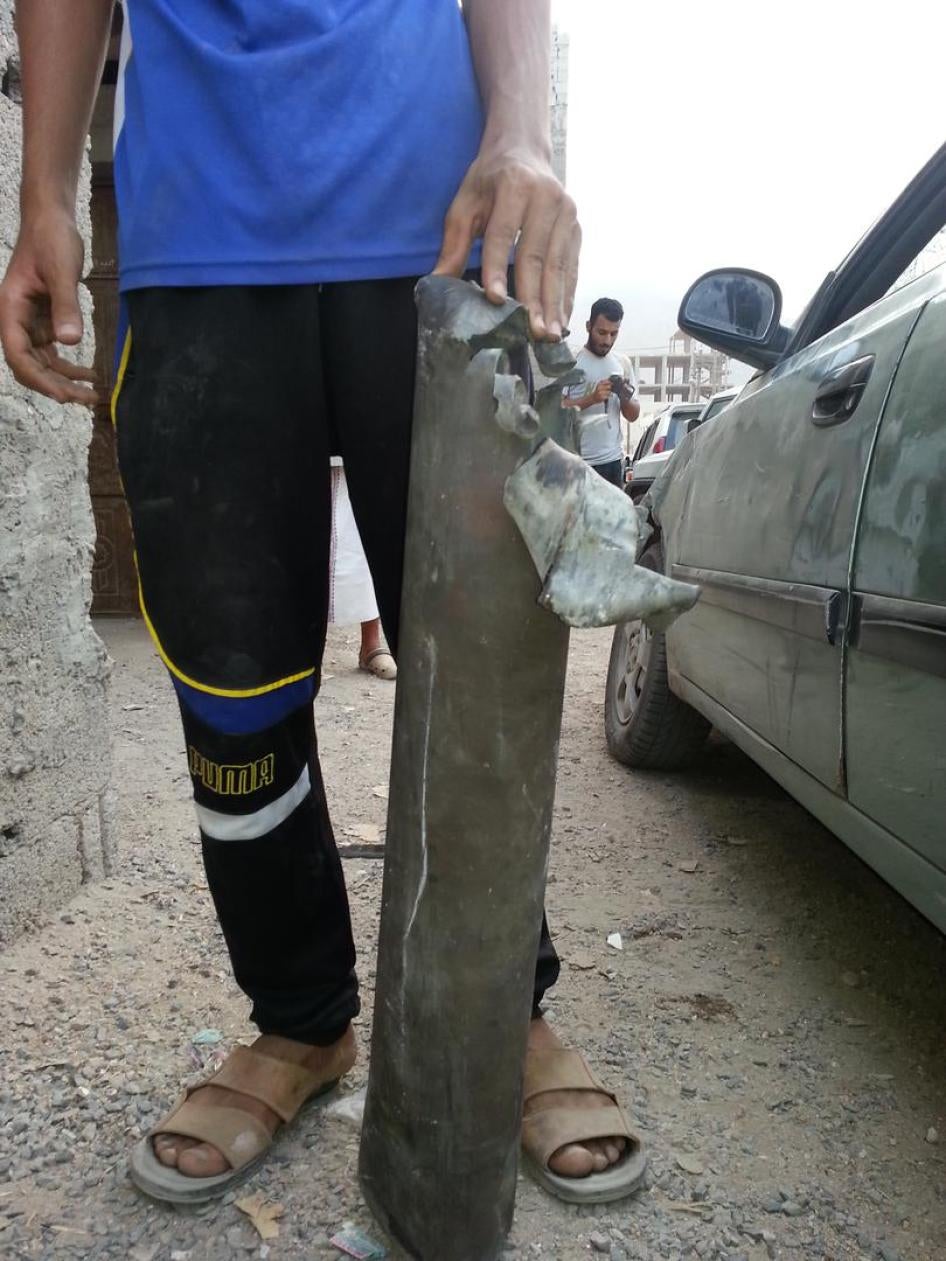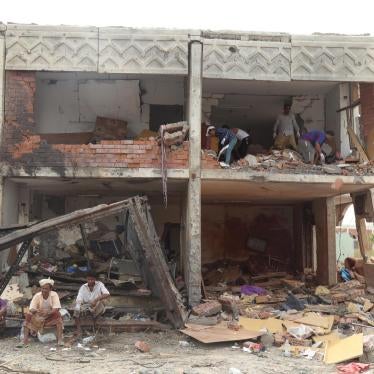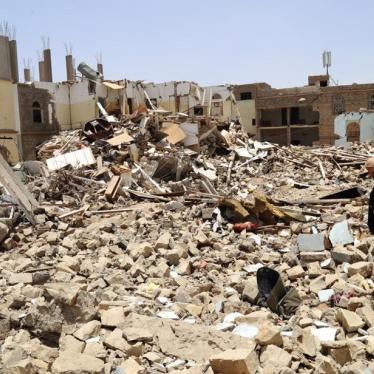(Beirut) – Pro-Houthi forces have repeatedly fired mortar shells and rockets indiscriminately into populated areas in the southern Yemeni port city of Aden in violation of the laws of war. In the deadliest attack, on July 19 in Dar Saad district, mortar fire killed several dozen civilians, including children.
Leaders of the Houthis, also known as Ansar Allah, should immediately cease indiscriminate attacks by their own and allied forces and take all possible steps to minimize harm to civilians. Houthi forces should not use explosive weapons with wide-area effect in populated areas because of the inevitable harm they cause to civilians.
“Pro-Houthi forces have been raining mortar shells and rockets onto populated areas of Aden with no apparent regard for the civilians remaining there,” said Ole Solvang, senior emergencies researcher. “These unlawful attacks take a terrible human toll and should stop immediately.”
Human Rights Watch visited four areas in Aden controlled by southern resistance forces that had come under fire from Houthi rockets and mortars since July 1. Human Rights Watch also interviewed four Aden residents by phone and reviewed photographic evidence and video footage of the attacks and their aftermath published on social media.
Investigation of the impact sites and weapons remnants shows the use of multiple rockets and mortar rounds with blast and fragmentation effects that can cause injuries and damage over a wide area. These weapons, in particular unguided rockets, are difficult to target with accuracy, and when directed toward populated areas are indiscriminate. Indiscriminate attacks violate the laws of war and amount to war crimes when carried out deliberately or recklessly. Human Rights Watch has previously documented the use of unguided rockets against populated areas in Saudi Arabia by pro-Houthi forces in Yemen.
Human Rights Watch investigated attacks that struck areas under the control of the southern resistance committees. The areas were attacked repeatedly over several days, excluding the possibility of misdirected fire. Impact marks on buildings and walls indicated that the munitions had come from the direction of the front lines, and the impact areas were within range of pro-Houthi forces.
Human Rights Watch presented details of the attacks with Ansar Allah authorities in Sanaa, the capital, but they did not provide any concrete information about the attacks or their intended targets. A representative of Ansar Allah from the Ministry of Human Rights said that he would welcome an investigation, even an international one, including of alleged violations by Houthi forces.
Local residents in the areas attacked said that no southern resistance fighters were in those areas and that the fighters had not used the areas to launch attacks against the Houthis. Human Rights Watch saw no evidence of military installations or other military objectives that would constitute legitimate targets.
International humanitarian law – the laws of war – governs the hostilities in Yemen and Saudi Arabia. It prohibits indiscriminate attacks, which strike military objectives and civilians or civilian objects without distinction. Examples include attacks that are not directed at a specific military objective or that use weapons, such as unguided rockets, that cannot be directed at a specific military objective.
Military commanders must choose a means of attack that can be directed at military targets and will minimize incidental harm to civilians. Weapons that are so inaccurate that they cannot be directed at military targets without imposing a substantial risk of civilian harm should not be deployed. Forces deployed in populated areas must avoid locating military objectives near densely populated areas and try to remove civilians from the vicinity of military activities.
“Houthi leaders should realize that they could face a war crimes trial for ordering or even just overseeing indiscriminate rocket attacks on civilian neighborhoods,” Solvang said.
July 19 Attack on Dar Saad
Pro-Houthi forces fired mortar shells into Dar Saad, one of Aden’s northern districts, on the morning of July 19, local residents told Human Rights Watch. The shelling killed nearly 100 people, most of them civilians, according to Doctors without Borders (MSF). Human Rights Watch visited the scene of the attack the next day, July 20.
Local residents said that mortar fire began hitting the Dumina neighborhood, in the eastern part of Dar Saad, at about 9 a.m. and continued for several hours, during which mortar shells also hit the nearby Shaikhan neighborhood and the Insha’at neighborhood in western Dar Saad.
In Shaikhan, several mortar shells hit close to the local mosque. One exploded about 20 meters away between 10:30 and 11 a.m., injuring many children who were waiting in a line to collect water, witnesses said. A local policeman told Human Rights Watch:
There were many injured. I couldn’t count them all. I myself helped perhaps 15-16 children who were wounded, all of them between 9 and 12-years-old, and most of them had been standing in line for water.
Another mortar shell fell near the mosque’s main gate at about 12:30 p.m. as worshipers emerged from noon prayers, killing at least five civilians, witnesses said.
Several mortar rounds also struck the western part of Dar Saad. In the Insha’at neighborhood, a mortar shell that hit a truck in the street near a shop on Maydan street at about 9:30 a.m. wounded at least three people. Shortly after the first impact, another mortar shell struck the area next to the shop, killing at least nine people, including a 10-year-old child, and injuring at least six others, including five children, witnesses said.
A third shell hit a house at about 10 a.m. Ali Ahmad Muhammad Nagi, 45, the owner, told Human Rights Watch:
A shell fragment penetrated the roof and the first floor and got stuck in the ceiling of the ground floor, right above the bed where my 7-year-old daughter was sleeping. She is suffering now, wakes up frightened at night, in panic, remembering the loud sounds and seeing the tip of the shell hanging over her head. I was scared myself so how do you think she felt? Then the shells started raining over the area, here, there, everywhere, exploding among people helping the wounded.
Local residents said that at least 12 shells hit the neighborhood that morning.
Human Rights Watch examined more than 15 impact sites in eastern and western Dar Saad. At several there were munition remnants such as tail sections that are distinctive indicators of a mortar shell. Based on their knowledge from previous attacks, local residents said they thought the remnants came from 120 mm mortars. This was consistent with the findings of a Human Rights Watch analysis of remnants.
The areas of Dar Saad that the mortar shells hit are all two or three kilometers south of the front line between the Houthi and southern resistance forces fighting for control of Aden. Human Rights Watch examined at least four sites where mortar shells had struck the north and front-line-facing walls of buildings indicating that they had come from positions held by Houthi forces. In general, 120 mm mortars have a minimum range of 500 meters and a maximum range of over 7 kilometers. These shells can produce casualties on exposed people up to 60 meters away from the point of impact.
The international humanitarian aid organization Doctors Without Borders (MSF), which runs a hospital in Aden, reported that attacks on Aden on July 19 killed nearly 100 people and wounded about 200 others. The head of MSF in Yemen said that 80 percent of the overall casualties were civilians.
July 9 Attack on Little Aden
At least six rockets struck B-class, a residential neighborhood close to the Aden Refinery Company in Little Aden on a peninsula west of the main city, on the afternoon of July 9. The attack killed 70-year-old Hassan Zaid, local residents said. Zaid died when a rocket struck the eastern side of the concrete wall surrounding al-Massila primary school, where more than 200 people displaced by the fighting had sought shelter, residents said. Human Rights Watch viewed a fragment pattern visible on the eastern side of the wall, but not western, indicating that it almost certainly came from the east.
Another rocket struck the north face of a house about 500 meters west of the school, also damaging a neighboring house and seriously wounding Hussein Rauf, 19. Doctors had to amputate both of his legs, local residents said.
At least four other rockets struck the area without causing further casualties. Local residents showed Human Rights Watch a large object at one site that appeared to be the remnant of a 122 mm unguided rocket.
Taken together, the damage to the school wall and the residential buildings indicate that the rockets came from the northeast. Pro-Houthi forces were in the Tawahi district, 15 kilometers away and north of the Aden airport, 20 kilometers away. In general, unguided 122 mm rockets have a minimum range of at least a kilometer and a maximum range of 20 kilometers. However, given the many variations and performance improvements made by some manufacturers, some 122 mm rockets may be capable of reaching ranges approaching 40 kilometers.
Local residents said a rocket also struck the nearby Kod al-Namer residential neighborhood at about 1 a.m. on July 9, slightly injuring one man and damaging three houses.
The attacks in Little Aden may have been directed at the Aden oil refinery. Rockets struck the refinery on June 27 and on July 13, according to media reports.
July 7 Attack on Mansoura District
Rockets and mortar shells struck Wadea Hadad, a residential area about 500 meters west of Mansoura central prison in Mansoura District, between 10 p.m. on July 7 and 2 a.m. on July 8, killing at least six civilians and seriously wounding others, residents told Human Rights Watch. They named six of the dead, who included one woman and two children belonging to the Saleh family, ages 2 and 6. The dead children’s mother and 10-year-old sister were critically injured.
Mahmoud Abdulaziz, 29, said that the rockets struck in numerous places, some in the streets and some on cars: “I saw five people get killed in that attack, all of them civilians from this area,” Abdulaziz said.
Residents said that Gunblat Saleh Fadel, 32, died when a munition hit his car as he sought to move it to a safer place, and that a rocket killed two other people when it exploded near their car as they attempted to evacuate people from the neighborhood.
Some residents said that they could distinguish between rocket and mortar attacks because rockets generally caused greater damage to buildings, and showed Human Rights Watch rocket remnants that they had found after the attack.
The neighborhood that came under attack is known as “Army Buildings” to local residents because the Yemeni authorities formerly allocated apartments in the area to military officers. However, local residents told Human Rights Watch that there had been no firing of rockets, mortars, or other weapons from the area or any significant deployment of fighters that could have provided a justification for the Houthi attack on July 7.
July 1 Attack on Mansoura District
Multiple rockets struck Blocks 4 and 5, two residential neighborhoods in Mansoura District early on the morning of July 1, local residents said. The attack killed 18 civilians, including a child, and wounded 23 others, according to Al-Khader al-Aswar, director of the Aden office of Yemen’s Health Ministry.
Local residents said that the first rocket struck near Mansoura central prison near midnight on June 30, killing one man. A short time later, a second rocket hit a gas station on Prison Street about 40 meters from the Infinity Hotel, then accommodating several hundred people displaced by the fighting. Then, after dozens of people had rushed to the site to see if there were casualties, a third rocket hit the street nearby.
Muhammad Hussein al-Hamed, who was staying at the hotel and standing in front of it when the third rocket struck, said:
I heard a huge explosion when something hit the ground in the middle of the street right next to us. I felt something piercing my skin and bone in my right arm, my foot and the area between my thighs. I screamed. I managed to get back to the hotel on my own, but there I fainted from the pain and bleeding.
Al-Hamed said he saw about 10 other people wounded by the rocket strike. Another hotel resident said that 16 people staying there were wounded, some severely.
About one hour later, a fourth rocket struck room 411 on the fourth floor of the Royal Concorde Hotel, adjacent to the Infinity Hotel, wounding a mother and her child. One of the people staying at the Royal Concorde said:
Women and children were screaming, running out of their apartments without even wearing abayas or taking their bags. The fourth floor was filled with smoke. The family living in 411 had come to Mansoura to seek safety. Now the wife and child are in critical condition in the hospital.
At about 5:30 a.m. another rocket struck a two-story home about 40 meters from the Infinity Hotel. Omar Saleh Omar, 54, a bus driver who was living on the first floor of the house, said:
I had just returned from prayer in the mosque when I heard two huge explosions. The whole house was filled with smoke. I couldn’t see or breathe. My daughters were screaming. A fan had fallen on my oldest daughter, injuring her face, hands, and legs. When we got out of the house, we saw that the second floor was burning.
The rocket had struck the second floor of the building, where a couple lived with their 8-month-old daughter, killing the baby and mortally wounding the father, Omar said.
“It was awful, that day was awful,” Omar said. “I will never forget how she [the mother] screamed and cried. Now she doesn’t speak at all. She has been in shock since that day.”
